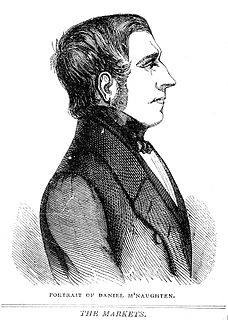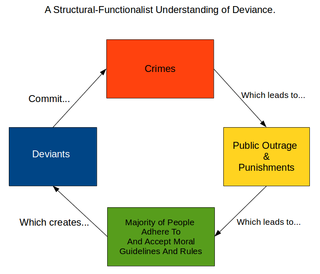The insanity defense, also known as the mental disorder defense, is an affirmative defense by excuse in a criminal case, arguing that the defendant is not responsible for their actions due to an episodic or persistent psychiatric disease at the time of the criminal act. This is contrasted with an excuse of provocation, in which the defendant is responsible, but the responsibility is lessened due to a temporary mental state. It is also contrasted with a finding that a defendant cannot stand trial in a criminal case because a mental disease prevents their from effectively assisting counsel, from a civil finding in trusts and estates where a will is nullified because it was made when a mental disorder prevented a testator from recognizing the natural objects of their bounty, and from involuntary civil commitment to a mental institution, when anyone is found to be gravely disabled or to be a danger to themself or to others.

The M'Naghten rule is any variant of the 1840s jury instruction in a criminal case when there is a defence of insanity:
that every man is to be presumed to be sane, and ... that to establish a defence on the ground of insanity, it must be clearly proved that, at the time of the committing of the act, the party accused was labouring under such a defect of reason, from disease of the mind, as not to know the nature and quality of the act he was doing; or if he did know it, that he did not know he was doing what was wrong.
In law, attendant circumstances are the facts surrounding an event.
In criminal law, diminished responsibility is a potential defense by excuse by which defendants argue that although they broke the law, they should not be held fully criminally liable for doing so, as their mental functions were "diminished" or impaired.
An affirmative defense to a civil lawsuit or criminal charge is a fact or set of facts other than those alleged by the plaintiff or prosecutor which, if proven by the defendant, defeats or mitigates the legal consequences of the defendant's otherwise unlawful conduct. In civil lawsuits, affirmative defenses include the statute of limitations, the statute of frauds, waiver, and other affirmative defenses such as, in the United States, those listed in Rule 8 (c) of the Federal Rules of Civil Procedure. In criminal prosecutions, examples of affirmative defenses are self defense, insanity, entrapment and the statute of limitations.

Forensic psychology involves the application of psychological knowledge and methods to help answer legal questions arising in civil or criminal proceedings. Historically, forensic psychology was defined narrowly as the application of clinical psychological knowledge to criminal cases or questions in criminal justice settings. Contemporary definitions of forensic psychology recognize that several subfields of psychology apply "the scientific, technical, or specialized knowledge of psychology to the law." While the American Psychological Association (APA) officially recognized forensic psychology as a specialty under the narrower definition in 2001, the Specialty Guidelines for Forensic Psychologists were revised in 2013 and now reference several psychology subdisciplines, such as social, clinical, experimental, counseling, and neuropsychology).

Forensic psychiatry is a subspeciality of psychiatry and is related to criminology. It encompasses the interface between law and psychiatry. According to the American Academy of Psychiatry and the Law, it is defined as "a subspecialty of psychiatry in which scientific and clinical expertise is applied in legal contexts involving civil, criminal, correctional, regulatory, or legislative matters, and in specialized clinical consultations in areas such as risk assessment or employment." A forensic psychiatrist provides services – such as determination of competency to stand trial – to a court of law to facilitate the adjudicative process and provide treatment, such as medications and psychotherapy, to criminals.
A Durham rule, product test, or product defect rule is a rule in a criminal case by which a jury may determine a defendant is not guilty by reason of insanity because a criminal act was the product of a mental disease. Examples in which such rules were articulated in common law include State v. Pike (1869) and Durham v. United States (1954). In Pike, the court wrote, "An accused is not criminally responsible if his unlawful act was the product of mental disease or mental defect."
In United States and Canadian law, competence concerns the mental capacity of an individual to participate in legal proceedings or transactions, and the mental condition a person must have to be responsible for his or her decisions or acts. Competence is an attribute that is decision-specific. Depending on various factors which typically revolve around mental function integrity, an individual may or may not be competent to make a particular medical decision, a particular contractual agreement, to execute an effective deed to real property, or to execute a will having certain terms.
Clark v. Arizona, 548 U.S. 735 (2006), is a United States Supreme Court case in which the Court upheld the constitutionality of the insanity defense used by Arizona.
Settled insanity is defined as a permanent or "settled" condition caused by long-term substance abuse and differs from the temporary state of intoxication. In some United States jurisdictions "settled insanity" can be used as a basis for an insanity defense, even though voluntary intoxication cannot, if the "settled insanity" negates one of the required elements of the crime such as malice aforethought. However, U.S. federal and state courts have differed in their interpretations of when the use of "settled insanity" is acceptable as an insanity defense and also over what is included in the concept of "settled insanity".
An ultimate issue in criminal law is a legal issue at stake in the prosecution of a crime for which an expert witness is providing testimony.
Frendak v. United States, 408 A.2d 364 is a landmark case in which District of Columbia Court of Appeals decided that a judge could not impose an insanity defense over the defendant's objections.

Archuleta v. Hedrick, 365 F.3d 644 was a pro se petition for a writ of habeas corpus filed in the U.S. Court of Appeals for the Eighth Circuit in October 2002, appealing the dismissal of a case brought by defendant Benjamin Archuleta. Archuleta had been found not guilty by reason of insanity of assault and subsequently ordered to be confined in a prison mental hospital by the United States District Court for the Western District of Missouri after his successful insanity defense, as he was evaluated by a psychiatrist as dangerous. His appeal challenged this confinement and "forced treatment", requested a withdrawal of his original insanity defense, and sought his unconditional release from custody.
United States federal laws governing offenders with mental diseases or defects provide for the evaluation and handling of defendants who are suspected of having mental diseases or defects. The laws were completely revamped by the Insanity Defense Reform Act in the wake of the John Hinckley Jr. verdict.
The Insanity Defense Reform Act of 1984 (IDRA) was signed into law by President Ronald Reagan on October 12, 1984, amending the United States federal laws governing defendants with mental diseases or defects to make it significantly more difficult to obtain a verdict of not guilty only by reason of insanity.
Responsibility for criminal law and criminal justice in the United States is shared between the states and the federal government.
Durham v. United States, 214 F.2d 862, is a criminal case articulating what became known as the Durham rule for juries to find a defendant is not guilty by reason of insanity: "an accused is not criminally responsible if his unlawful act was the product of mental disease or mental defect."
The ALI rule, or American Law Institute Model Penal Code rule, is a recommended rule for instructing juries how to find a defendant in a criminal trial is not guilty by reason of insanity. It broadened the M'Naghten rule of whether a defendant was so mentally ill that he is unable to "know" the nature and quality of his criminal act, or know its wrongfulness, to a question of whether he had "substantial capacity to appreciate the criminality of [his] conduct". It also added a volitional component as to whether defendant was lacking in "substantial capacity to conform his conduct to the law". It arose from the case of United States v. Brawner.
Kahler v. Kansas, 589 U.S. ___ (2020), is a case of the United States Supreme Court in which the justices ruled that the Eighth and Fourteenth Amendments of the United States Constitution do not require that states adopt the insanity defense in criminal cases that are based on the defendant's ability to recognize right from wrong. It was argued on October 7, 2019 and decided on March 23, 2020.




